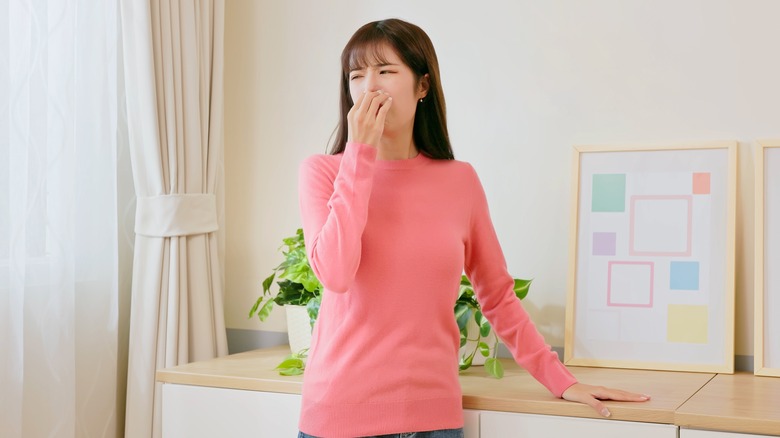Why You Should Call A Professional ASAP If Your Home Has A Bleach-Like Smell
Given the ubiquity of bleaching agents as a household cleaner, it isn't uncommon to walk into a pungent-smelling room that otherwise screams cleanliness to most homeowners. A high chlorine concentration in your drinking water or faulty plumbing can also cause your home to stink like a swimming pool. While these reasons sound benign and are easily solvable with a few steps, there's one that should have you running out of your abode and seeking professional help — a chlorine leak.
A product of fraternizing, chlorine gas gets released into the air when bleach is combined with acid- or ammonia-containing everyday cleaning agents, including toilet and window cleaners, hydrogen peroxide, and even the very versatile cleaning tool, vinegar. Poor handling of pool disinfectants can also let loose the toxic halogen. The gas has a strong, bleach-like odor that causes immense skin and eye irritation and can turn deadly with long exposure. It's best to get a professional to control the situation before it gets out of hand. Before you start panicking after getting a whiff of bleach odor, it's best to double-check chlorine's presence with its tell-tale signs.
Signs of chlorine gas leak
The biggest indication of chlorine leakage is undoubtedly its strong, noxious, characteristic smell that closely resembles a cleaning product's stench. While awfully foul, it doesn't stop there, moving on to irritate your eyes, nose, and skin. It can leave your eyes blurry or teary, eventually causing redness or a burning sensation. On inhalation, it reacts with the water present in your nasal cavity and lungs, per the Centers for Disease Control and Prevention (CDC). This forms an acid that eats away your tissues, restricting your breathing and, at worst, causing your respiratory system to break down permanently.
If your skin feels tingly, is scorching, or is developing frostbite, know that all of these are the after-effects of a chlorine leak. You may also feel nauseous and vomit out pinkish-white fluids after a few hours of exposure. Asthmatic people usually find its presence extremely disconcerting. Moreover, the sharp-smelling halogen gas is easily distinguishable from its yellowish-green color. Being denser than air, you can quickly detect its presence closer to the ground in leakage areas.
Why and how to deal with chlorine exposure
Coming into contact with chlorine gas is a source of alarm. An hour-long inhalation can cause nasal irritation, leaving you feeling short of breath for anything longer. Short contact can cause acute diseases like pulmonary edema — involving a pus build-up in your lungs — according to a 2010 article published in Proceedings of the American Thoracic Society. It'll leave you gasping for breath, or pneumonitis, a lung injury entailing dry coughing. However, higher chlorine concentrations can prove fatal in some cases. Once you've discovered that you're dealing with a gas leakage, ventilate your home to allow fresh air to replace the leaked gas. Proceed to evacuate the area immediately or move to higher ground to minimize exposure.
Once out, call 911 for help. If the central emergency services are unavailable, reach out to your county's emergency department to learn how to proceed further. If that's not possible, get in touch with the fire and police division responsible for your area. Also, inform the Poison Control Center about the leak to get it fixed. Visit your hospital's emergency department after getting the go-ahead from local officials and follow the steps outlined on the CDC website to deal with gas exposure.


